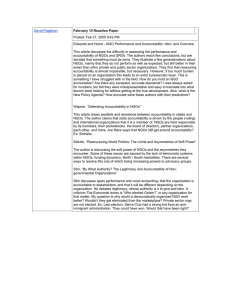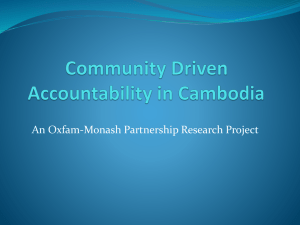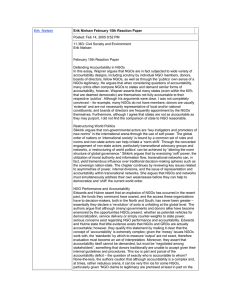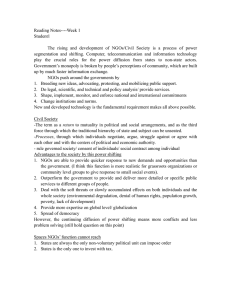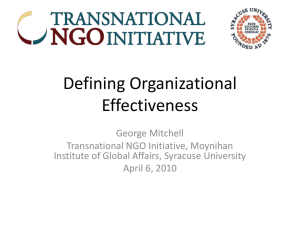Edwards and Hulme discuss the growth in number and impact... Agenda of spreading democracy and economic liberalization. On NGO...
advertisement
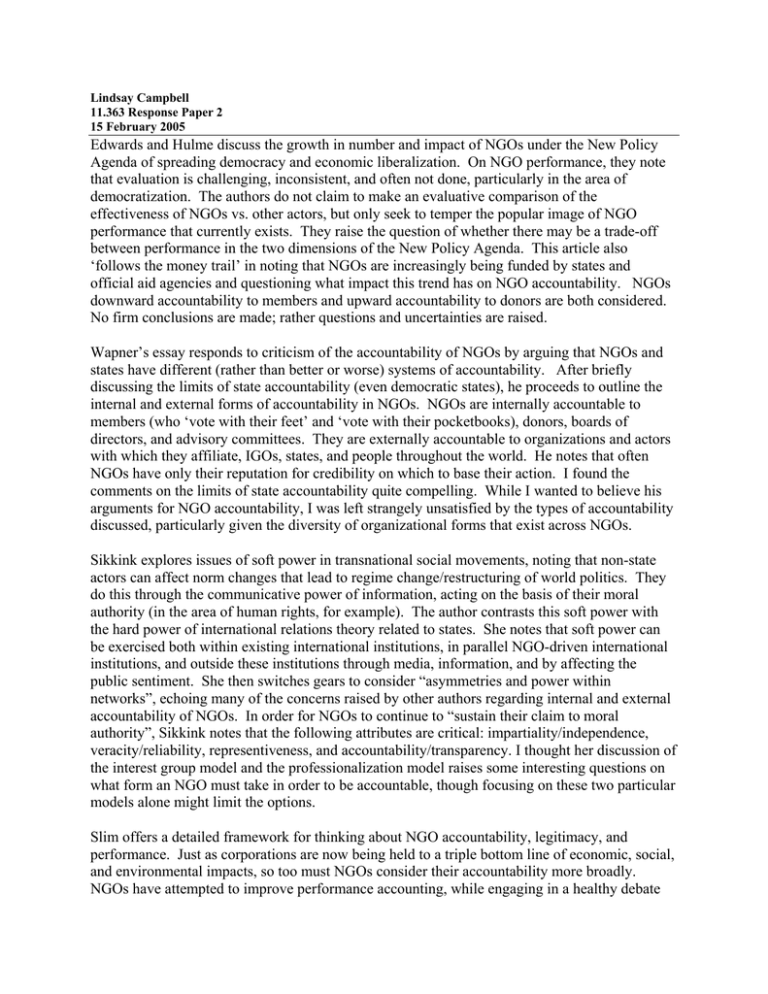
Lindsay Campbell 11.363 Response Paper 2 15 February 2005 Edwards and Hulme discuss the growth in number and impact of NGOs under the New Policy Agenda of spreading democracy and economic liberalization. On NGO performance, they note that evaluation is challenging, inconsistent, and often not done, particularly in the area of democratization. The authors do not claim to make an evaluative comparison of the effectiveness of NGOs vs. other actors, but only seek to temper the popular image of NGO performance that currently exists. They raise the question of whether there may be a trade-off between performance in the two dimensions of the New Policy Agenda. This article also ‘follows the money trail’ in noting that NGOs are increasingly being funded by states and official aid agencies and questioning what impact this trend has on NGO accountability. NGOs downward accountability to members and upward accountability to donors are both considered. No firm conclusions are made; rather questions and uncertainties are raised. Wapner’s essay responds to criticism of the accountability of NGOs by arguing that NGOs and states have different (rather than better or worse) systems of accountability. After briefly discussing the limits of state accountability (even democratic states), he proceeds to outline the internal and external forms of accountability in NGOs. NGOs are internally accountable to members (who ‘vote with their feet’ and ‘vote with their pocketbooks), donors, boards of directors, and advisory committees. They are externally accountable to organizations and actors with which they affiliate, IGOs, states, and people throughout the world. He notes that often NGOs have only their reputation for credibility on which to base their action. I found the comments on the limits of state accountability quite compelling. While I wanted to believe his arguments for NGO accountability, I was left strangely unsatisfied by the types of accountability discussed, particularly given the diversity of organizational forms that exist across NGOs. Sikkink explores issues of soft power in transnational social movements, noting that non-state actors can affect norm changes that lead to regime change/restructuring of world politics. They do this through the communicative power of information, acting on the basis of their moral authority (in the area of human rights, for example). The author contrasts this soft power with the hard power of international relations theory related to states. She notes that soft power can be exercised both within existing international institutions, in parallel NGO-driven international institutions, and outside these institutions through media, information, and by affecting the public sentiment. She then switches gears to consider “asymmetries and power within networks”, echoing many of the concerns raised by other authors regarding internal and external accountability of NGOs. In order for NGOs to continue to “sustain their claim to moral authority”, Sikkink notes that the following attributes are critical: impartiality/independence, veracity/reliability, representiveness, and accountability/transparency. I thought her discussion of the interest group model and the professionalization model raises some interesting questions on what form an NGO must take in order to be accountable, though focusing on these two particular models alone might limit the options. Slim offers a detailed framework for thinking about NGO accountability, legitimacy, and performance. Just as corporations are now being held to a triple bottom line of economic, social, and environmental impacts, so too must NGOs consider their accountability more broadly. NGOs have attempted to improve performance accounting, while engaging in a healthy debate on ‘voice accountability’ (in terms of who NGOs speak for and how truthfully they speak). The issue of voice is particularly relevant to development NGOs considering the north/south divide. Legitimacy is derived from both legal (e.g. UN Charter) and broader moral sources. Legitimacy is generated, Slim distinguishes, tangibly through support of members, relationships, knowledge and expertise, and performance and intangibly through trust, integrity, and reputation. This framework seemed to take the arguments of Wapner one step further in detail and clarity. Interestingly, he identifies the same basic alternatives of democratic social movements and accountable expert organizations that Sikkink highlighted.
